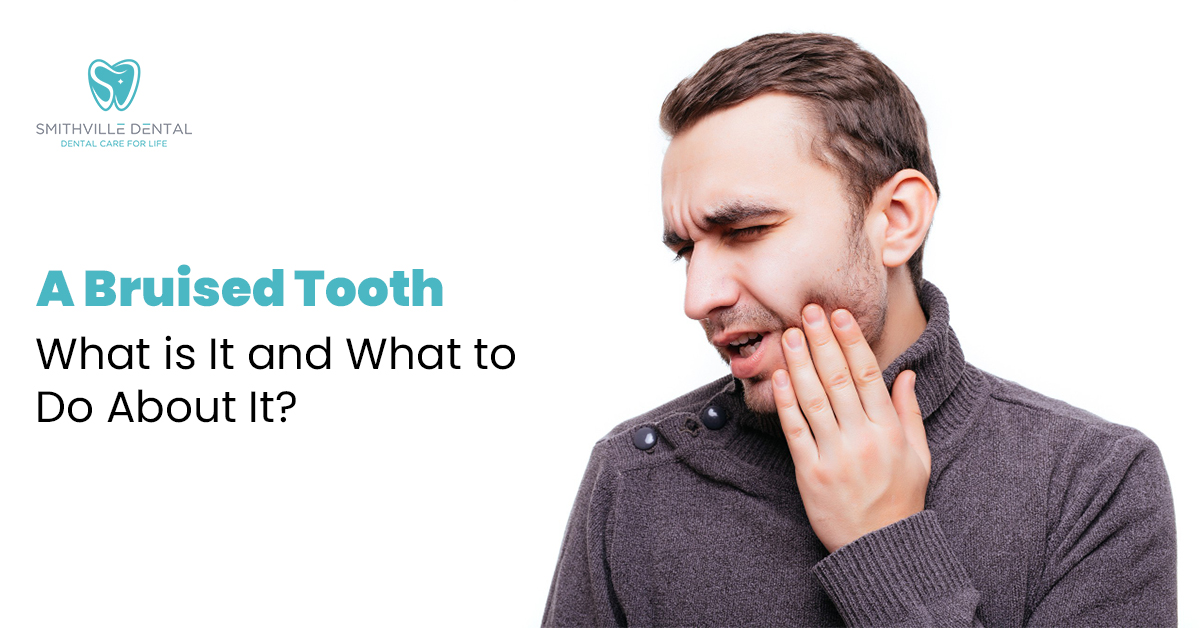Have you ever had tooth pain or sensitivity that wasn’t caused by any visible damage? It is possible that you have a tooth contusion, which is another name for a bruised tooth. A bruised tooth can be very uncomfortable and needs to be taken care of, even if it might not look as dangerous as a broken or cracked tooth.
This blog post, brought to you by your trusted Dentist in Smithville TX, will delve into the causes, symptoms and treatment options for a bruised tooth. We’ll help you understand what’s happening inside your mouth and guide you on the best course of action to take.
What Exactly is a Bruised Tooth?
A bruised tooth has internal damage as opposed to a fracture, which affects the tooth’s structure. The tooth becomes sensitive to temperature and pressure changes as a result of this internal injury, which also causes pain and inflammation. Consider it similar to bruising another area of your body. The impact damages the underlying tissues, producing discomfort and discoloration. A tooth’s interior damage shows up as pain and sensitivity, but it does not change pigment like skin does.
Common Causes
A tooth bruise can be caused by a number of things. Among the most common are: The most common reason is trauma. A tooth can be readily bruised by a hit to the mouth during sports, a fall or an accident.
Constantly pressing down on your teeth, especially while you are falling asleep, causes excessive stress on your teeth, which can cause inflammation and bruising. This condition is known as bruxism.
- Dental Operations: Extensive dental procedures like extractions or root canals can occasionally result in immediate tooth bruising.
- Biting Down on Hardened Objects: Pressing down on something hard, such as a hard candy or a chunk of ice, can also cause dental damage.
- Sinus Infections: In rare cases, sinus pressure and congestion may spread to the upper teeth, resembling the signs of a tooth bruise. To find the best course of action if you believe this to be the case, speak with your doctor.
Symptoms
Depending on the extent of the injury is, a bruised tooth might present with a variety of symptoms. Common symptoms include:
- Pain: A dull, continuous pain in the tooth that is impacted.
- Sensitivity: A greater sensitivity to meals and beverages that are hot, cold, or sweet.
- Tenderness: The tooth hurts when you bite it or put pressure on it.
- Discomfort: A sensation of pressure in the teeth or general discomfort.
It is important to remember that these signs may also point to other oral issues, including gum disease or cavities. If you experience any of these symptoms, it’s crucial to consult your Dentist in Smithville TX, for a proper diagnosis.
Treatment Options
Usually, treating a bruised tooth involves controlling the discomfort and letting the tooth recover on its own.
- Night Guard: A specially made night guard might shield your teeth from additional harm if teeth grinding is the cause.
- Root Canal Therapy: In rare instances, a root canal may be required if the tooth’s pulp is seriously damaged or infected.
Conclusion
Even though it is not usually obvious, a bruised tooth can be extremely sensitive and painful. For appropriate care, it is essential to comprehend the causes, symptoms, and available treatments. Do not hesitate to contact your Dentist in Smithville TX, for a thorough examination and individualized treatment plan if you think you may have a bruised tooth.

 Book Appointment
Book Appointment